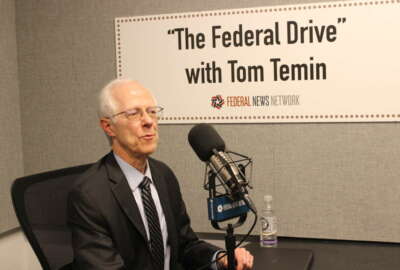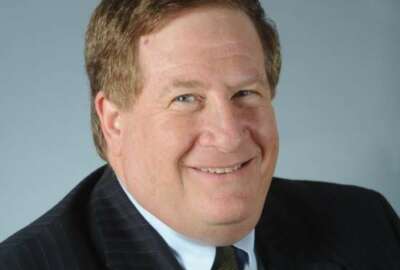
The Defense Department updates its rules for overseas operational support contractors
Wherever they operate in the world, the armed services rely on contractors for all sorts of support from fuel delivery to housing.
Best listening experience is on Chrome, Firefox or Safari. Subscribe to Federal Drive’s daily audio interviews on Apple Podcasts or PodcastOne.
Wherever they operate in the world, the armed services rely on contractors for all sorts of support from fuel delivery to housing. It can get complicated in terms of accounting and accountability. Now, the Defense Department has proposed a comprehensive revision of the rules under which operational contractors operate. Federal Drive with Tom Temin got the details from Leigh Method, the deputy assistant secretary of Defense for Logistics, in the Office of the Undersecretary of Defense for Acquisition and Sustainment.
Interview transcript:
Tom Temin: Ms. Method, good to have you on.
Leigh Method: Thank you [Tom]. I appreciate it. Thank you for having me today.
Tom Temin: Give us a sense of the operational contract support scope that happens right now in DoD – set the scene for us.
Leigh Method: Well, I appreciate it. Thank you. So actually, my journey with operational contract support actually started when I was still in uniform a number of years ago. I won’t give away my age on that but I was deployed to Afghanistan, I had a team of logisticians, and we were working with a team of interpreter translators. And I never really was curious, or I never really understood how they received their paycheck, whether they had access to services like could they eat in the dining hall with us or things like that. Now, fast forward to this job I’ve been in since last spring, now I have a much better appreciation as to the structure that’s needed to make sure that we are doing the right thing both by the contracting individual as well as the contract as well as the government. And that’s really what operational contract support is about. It sometimes sounds confusing if you didn’t hear the term. But if you change the words around a little bit, and you talk about contracts, support for operations, it makes a little bit more sense. And so that’s what this program is about. And the scope, it’s about managing accounting for and providing oversight of the contracted support that we use in our overseas theaters.
Tom Temin: And that contracted support goes pretty far along the gamut of operations from way in the back to making sure fuel depots are supplied all the way to very close to when there is a frontline or a battle. They’re not that far behind. Are they?
Leigh Method: No, not that far. In fact, they’re, you know, we do have contractors on the battlefield, as as many have witnessed over the last several decades, couple decades. They’re right there with us. And the battlefield is not a line anymore. It’s a theater, it’s an area. So they are right there with us. And we have about three, we have three different categories of contractors, the US contractors – the folks that are US citizens that we bring with us overseas into theater to do work with us, usually maintaining equipment for us, or they have some other special skill that we need. Then we also have local nationals, the foreign nationals that are from that host country. And they’re usually helping us with things like interpreting and translating and things like that. And then we have third country nationals that contracting organizations will bring in from third countries. They help with things, everything from providing food services, laundry and other types of base support services. So there’s three different categories. And so they are right there with us.
Tom Temin: And before we get into the details of the rules, I’m just curious that people that are on the battlefield, when that is happening, what are they actually doing? Because they can’t shoot, right, on behalf of America, because they’re not actually uniformed members of the armed services.
Leigh Method: Right. So depending on how the commander, the operational commander defines their need for “operations support” – interpreter translators perhaps is a good example of that – they will ride along with the forces to provide that support. But those tend to be at least in my experience, my personal experience, they are local nationals from that host country. There are rule sets that are part of the rule is to how we care and manage and make sure from a health and safety standpoint, those contractors are cared for, but that they can provide the services that we need to execute our mission.
Tom Temin: We’re speaking with Leigh Method, she’s the deputy assistant secretary of Defense for Logistics. These new rules then – tell us what they’re designed to do.
Leigh Method: So we have a rule in the Federal Register that we were trying to update. It was last updated in 2012. So it’s time for an update. The update is to reflect the lessons we’ve learned over the last 10 years as we’ve matured this capability. And it’s really not making huge changes, but it is trying to clarify things and trying to align with our updates to our defense policies. Three good examples of the key changes that are in this rule is defining defense contractor personnel as part of our total force, and that allows our operational commanders to plan for contracted personnel in their capabilities as they are developing their plan. Second example of something this rule is changing is to apply operational contract support to all operational scenarios, not just contingency scenarios – contingency operations – so we can work across a range of scenarios in terms of supporting our contractors. And then third, is it clarifies the responsibilities that both the DoD and the contractor have, based on our lessons learned. And a good example is when you have a contractor we’ve identified to deploy or to go into theater, the contractor is responsible for pre-deployment medical screenings to make sure that their personnel are medically fit to work in those austere, non-permissive environments that we asked them to operate in. And then the DoD is responsible for providing pre-deployment health threat briefings. So the contractor knows what they’re getting into. And also to provide some theater-specific immunizations that may not be widely available to the public.
Tom Temin: And when you mentioned broadening the types of operations when contracted support and might be employed, and I’m reading right from the rule summary, does that take it beyond Iraq and Afghanistan?
Leigh Method: So it’s really about operational missions. So if you’re talking about a staff, or someone who say is mowing the lawn in Germany, that’s not necessarily what we’re talking about. We’re talking about operations, like humanitarian disasters and things like that. So and it would apply globally, it’s really we’re talking about our overseas contractors that are providing operational support to operational missions.
Tom Temin: And there has been some critique over the years from the couple of inspectors general, special inspectors general for Iraq and Afghanistan. And there is also the GAO, which regularly weighs in on these things. Are some of the rule changes designed to meet their, I guess, requests or recommendations for more accountability in all of this?
Leigh Method: Well, certainly, that’s what operational contract support is all about. It’s about accounting and accountability of our contractors. It’s really come home to us in the last year, as we’ve worked through this COVID pandemic. We’ve had to provide support to our contracted personnel that are completing their contract tours, and they needed to get home. We had to work with a number of organizations and agencies such as the State Department and others to help return our contractors to their home, US contractors back to the United States, and then our third country nationals back to their host countries. At the same time trying to also bring contractors back in to theater to be able to continue the work that the operational commander requires.
Tom Temin: It’s amazing. There’s no aspect of national life of government operations I haven’t talked about in the past year that has not been affected in some way by the pandemic.
Leigh Method: Oh exactly. It’s been very interesting. I’ve learned so many new things in the last year as all of us have, particularly in this area. But I think the rule change that we talked about, about identifying contractors, as part of our total force really highlights the vital capabilities that our contractors bring to the battlefield. I mean, they provide a skill set and a capability that we can’t really maintain on our roles long term. If you only need a translator, say for three months, you don’t want to carry on your roles for longer than that, because you’re you’re wasting resources. So we really are about being good stewards of the taxpayer dollars. At the same time, while they’re essentially in our care or in our theater operating, we want to make sure we are doing right by them as an individual but also by the contract and the American public.
Tom Temin: And what is the deadline for commenting on these proposed rules? And have you had any comments so far from industry? And do you have any sense of so far, what they’re telling you?
Leigh Method: We have not received any comments from industry yet. The the public comment period is still open. And we know that they are aware of the proposed updates, and we look forward to receiving their comments. Certainly, we want to coordinate these changes as widely as possible to make sure that they are well suited to the lessons we’ve learned over the last 10 years.
Tom Temin: And normally foreign entities aren’t really eligible to comment on us rulemaking. But this does involve foreign contractors. Is there a way of getting comments from them into this whole rulemaking process?
Leigh Method: Great question. So certainly, the comment period is open. And anybody can comment. Whether those comments can be incorporated into the rule set are different matter. We’re trying to benefit the operational contract support program. And so certainly, that would be an interesting comments to receive. But the comments from foreign contractors will tend to come to us through the combatant commands, like Central Command, for example.
Tom Temin: Sure, so the contractor could tell the command and then the command could tell the rulemaking site and that way, you’d get it indirectly. But everything would be kosher.
Leigh Method: Correct. Yes, that’s a great way to put it.
Tom Temin: All right. And just a final question: Do you have any sense roughly, to the nearest billion, of what the United States spends on oversees operational contract support in a given year?
Leigh Method: Well, certainly the department spends quite a bit on contracts outside the United States. It varies. And the role of operational contract support is really about for whatever we do contract for that we have visibility and accountability for those contracts and those contracting personnel. So the spending certainly is quite large, and it supports and enables many of our missions and requirements. But the goal for operational contract support is to make sure we’re spending smartly and that we’re avoiding duplication and supporting our mission goals. OCS is not specifically aimed at the cost of doing that business, but it’s making sure we’re doing business the right way when it comes to our contractors.
Tom Temin: Leigh Method is the deputy assistant secretary of Defense for Logistics in the Office of the Undersecretary of Defense for Acquisition and Sustainment. Thanks so much for joining me.
Leigh Method: Thanks so much for your time and giving me the opportunity to talk about this very important program.
Tom Temin: We’ll post this interview along with a link to the proposed rule at FederalNewsNetwork.com/FederalDrive. Hear the Federal Drive on demand. Subscribe at Apple Podcasts or wherever you get your shows.
Copyright © 2024 Federal News Network. All rights reserved. This website is not intended for users located within the European Economic Area.
Tom Temin is host of the Federal Drive and has been providing insight on federal technology and management issues for more than 30 years.
Follow @tteminWFED
Related Stories

Defense contractors are putting together self-assessments of their cybersecurity




